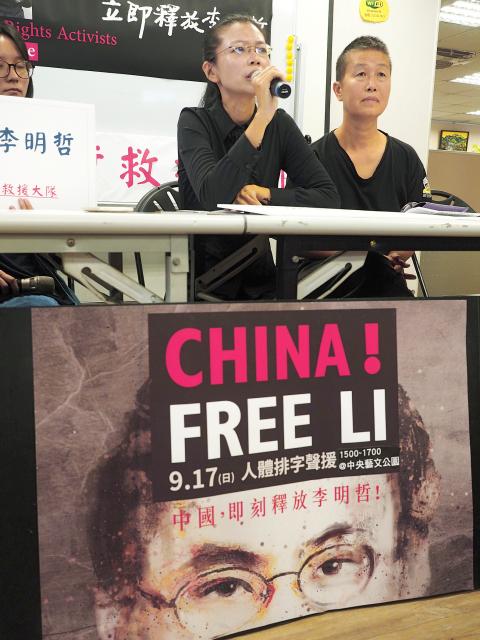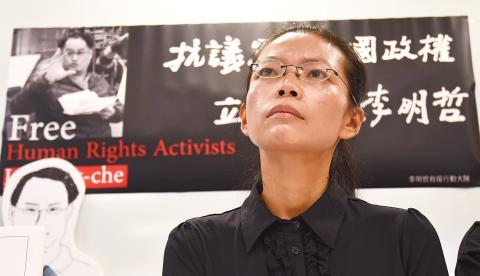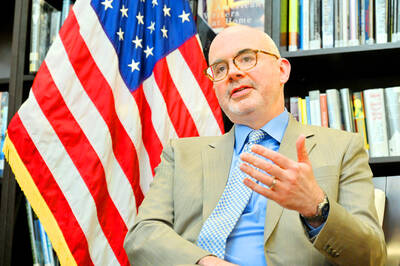Lee Ching-yu (李凈瑜) — wife of Taiwanese human rights advocate Lee Ming-che (李明哲), who is imprisoned in China on charges of subversion — yesterday said her husband might be pressured into pleading guilty when his trial opens tomorrow.
“At this moment, I want to ask my compatriots for their understanding if they see him do or say anything unbearable in court outside of his free will,” she told a news conference in Taipei. “This is just the Chinese government being adept” at forcing confessions, she said.
She said she would attempt to enter China on a landing visa today, as moves by the Chinese government have thrown her invitation to observe her husband’s trial into doubt.

Photo: EPA
The Mainland Affairs Council, which has been helping arrange plane tickets and travel documents, has advised her to attempt to enter China on a landing visa, following the failure of an application for a new “Taiwan Compatriot Permit” after she refused to renew contact with her husband’s Chinese-appointed lawyer, she said.
She said a man named Zhang Zhongwei (張忠偉) called her on Thursday to inform her of her husband’s impending trial at the Intermediate People’s Court in Yueyang, Hunan Province, instructing her to immediately apply for travel documents.
“As I do not acknowledge the validity of the Chinese court, I will not get involved in legal details other than asking the time and location of the trial, because I want to see my husband,” Lee Ching-yu said. “I am not going to participate, I am going to see my husband and tell him I stand with him.”

Photo: Liu Hsin-de, Taipei Times
Her previous Taiwan Compatriot Permit was revoked by Beijing in April, which prevented her from flying to China to search for her husband.
Judicial Reform Foundation executive secretary Hsiao I-ming (蕭逸民) said that he, former Democratic Progressive Party legislator Wang Li-ping (王麗萍), one unnamed human rights advocate and officials from the council and the Straits Exchange Foundation (SEF) have sent official applications to China’s Taiwan Affairs Office to accompany Lee Ching-yu to the trial, but the prospects look bleak.
“We will not attempt to attend or get close to the trial site as private individuals, because that would very likely result in a second Lee Ming-che. We will go only if we receive official permission,” Wang said, adding that she had directly contacted the Yueyang court.
The court said that while Lee Ming-che is to be given an “open” trial, Taiwanese may only observe if they receive permission from the Taiwan Affairs Office, she said.
“Under Chinese law, only close relatives — namely Lee Ming-che’s wife, mother and father — have a right to attend, and it looks like authorities will not permit anyone else, including SEF officials,” Wang said.
“While they are saying this is an open trial, that is not the truth if they are only going to let their own people observe,” Taiwan Association for Human Rights secretary-general Chiu Ee-ling (邱伊翎) said, echoing advocates’ charges that China is taking steps to ensure its full control over a show trial.
“In choosing to put on an open trial, the signal they are sending is that Lee Ming-che is going to make a public confession. The Chinese lawyer’s manipulation of his mother is just more proof that this is all a show,” Wang said.
She was referring to reports on Friday that Lee Ming-che’s mother, who is in her 70s and has never appeared publicly in connection with the case, had suddenly applied through the council to attend the trial.
Lee Ching-yu confirmed that she had sent the council a message in an attempt to prevent her mother-in-law’s attendance at the trial.
“My objective was to save a desperate situation and stop a humiliating show,” she said.
Lee Ming-che’s mother has a “different political stance” from her son and daughter-in-law and has called on her son to “apologize to his Chinese mother country” after learning of his detention, Wang said.
She also threw out his collection of books and political materials during Lee Ching-yu’s trip to the US in May, she added.
While Lee Ming-che has been charged with attempting to overthrow the Chinese government, Lee Ching-yu has maintained that he was visiting China to share Taiwan’s “experience of democratization” with Chinese friends.
The Chinese government has apparently decided to wrap up Lee Ming-che’s case prior to the Chinese Communist Party’s 19th National Congress next month, even though a final outcome remains uncertain, Wang said.
“The problem is that his mother’s paperwork has gone through, but ours has not,” Wang said. “Chinese authorities seem to be making participation dependent on whether Lee Ching-yu will play their assigned role for her.”
While the council requested that Lee Ching-yu contact her husband’s lawyer, its advice that she pursue a landing visa demonstrates that it has had some contact with Chinese authorities, despite official avowals to the contrary, Wang said, adding that Lee Ching-yu rejected its requests because her husband’s case is a “political question.”
Chiu said that she and Covenants Watch chief executive officer Huang Yi-bee (黃怡碧) are to still meet tomorrow for an initial UN Human Rights Council Working Group on Enforced or Involuntary Disappearances meeting on Lee Ming-che’s case.
The sudden announcement and timing of his trial have effectively forestalled Lee Ching-yu’s participation at the meeting, she added.
Additional reporting by CNA and AP

SEPARATE: The MAC rebutted Beijing’s claim that Taiwan is China’s province, asserting that UN Resolution 2758 neither mentions Taiwan nor grants the PRC authority over it The “status quo” of democratic Taiwan and autocratic China not belonging to each other has long been recognized by the international community, the Mainland Affairs Council (MAC) said yesterday in its rebuttal of Beijing’s claim that Taiwan can only be represented in the UN as “Taiwan, Province of China.” Chinese Minister of Foreign Affairs Wang Yi (王毅) yesterday at a news conference of the third session at the 14th National People’s Congress said that Taiwan can only be referred to as “Taiwan, Province of China” at the UN. Taiwan is an inseparable part of Chinese territory, which is not only history but

CROSSED A LINE: While entertainers working in China have made pro-China statements before, this time it seriously affected the nation’s security and interests, a source said The Mainland Affairs Council (MAC) late on Saturday night condemned the comments of Taiwanese entertainers who reposted Chinese statements denigrating Taiwan’s sovereignty. The nation’s cross-strait affairs authority issued the statement after several Taiwanese entertainers, including Patty Hou (侯佩岑), Ouyang Nana (歐陽娜娜) and Michelle Chen (陳妍希), on Friday and Saturday shared on their respective Sina Weibo (微博) accounts a post by state broadcaster China Central Television. The post showed an image of a map of Taiwan along with the five stars of the Chinese flag, and the message: “Taiwan is never a country. It never was and never will be.” The post followed remarks

INVESTMENT WATCH: The US activity would not affect the firm’s investment in Taiwan, where 11 production lines would likely be completed this year, C.C. Wei said Investments by Taiwan Semiconductor Manufacturing Co (TSMC, 台積電) in the US should not be a cause for concern, but rather seen as the moment that the company and Taiwan stepped into the global spotlight, President William Lai (賴清德) told a news conference at the Presidential Office in Taipei yesterday alongside TSMC chairman and chief executive officer C.C. Wei (魏哲家). Wei and US President Donald Trump in Washington on Monday announced plans to invest US$100 billion in the US to build three advanced foundries, two packaging plants, and a research and development center, after Trump threatened to slap tariffs on chips made

CONSISTENT COMMITMENT: The American Institute in Taiwan director said that the US would expand investment and trade relationships to make both nations more prosperous The US would not abandon its commitment to Taiwan, and would make Taiwan safer, stronger and more prosperous, American Institute in Taiwan Director Raymond Greene said. “The US’ commitment to Taiwan has been consistent over many administrations and over many years, and we will not abandon our commitment to Taiwan, including our opposition to any attempt to use force or coercion to change Taiwan’s status,” he said in an exclusive interview with the Liberty Times (the sister newspaper of the Taipei Times) on Friday last week, which was published in the Chinese-language newspaper yesterday. The US would double down on its efforts